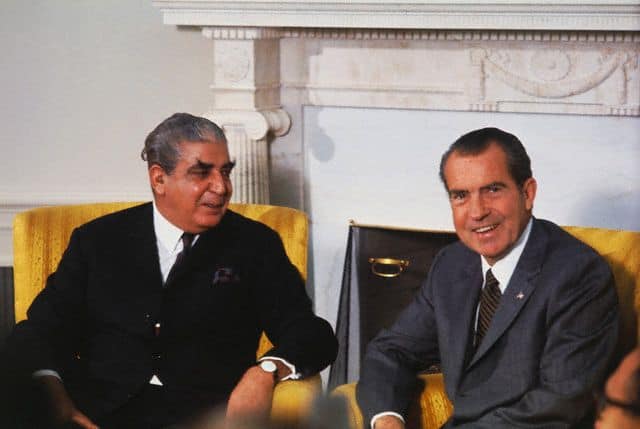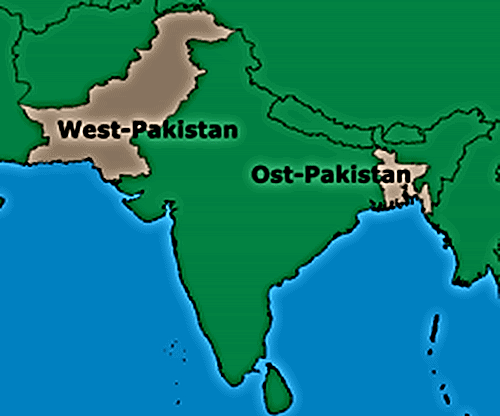With a simple “good luck” from President Richard Nixon, Ambassador Joseph Farland set out to Pakistan, unsure of what to expect. Having previously worked with the Federal Bureau of Investigation (FBI) during World War II, Ambassador Farland was always cautious of those around him.

Thus, when he entered this post, he had been preparing for the worst. And the worst is what he got. The Indo-Pakistani War of 1971 erupted while he was stationed in Islamabad. As all other foreign diplomats left the country, those in the U.S. Embassy stayed put, many not realizing that their ambassador had devised an escape route from the country for all of them, in case the situation became too dangerous.
The Indo-Pakistani War of 1971 started in early December with air strikes on Indian air stations. At that time, Pakistan controlled two different territories: East Pakistan and West Pakistan (now Bangladesh and modern-day Pakistan, respectively). The preemptive air strikes led to greater hostilities between West Pakistan and India, leading the latter to support the Liberation War for Bangladesh. Militarily, India planned on splitting West Pakistan in two, breaking Islamabad and Karachi away from each other, thus weakening the power of West Pakistan. With West Pakistan weakened, it would be harder to fight the insurgency in East Pakistan. Despite what the leaders of West Pakistan believed, they did in fact start the war, and they were not going to win it.
The war only lasted 13 days, ending in the middle of December of 1971 with the fall of Dacca and the establishment of Bangladesh. The main goal of this specific war was to achieve East Pakistani independence. While other wars between Pakistan and India have followed, no other ambassador since Farland has had to devise a secret escape route from Pakistan or been “the only one left.”
Joseph Farland’s interview was conducted by Charles Stuart Kennedy on January 31, 2000.
Read Joseph Farland’s full oral history HERE.
Read another account of Ambassador Joseph Farland’s service HERE.
Drafted by Martina Beggy
ADST relies on the generous support of our members and readers like you. Please support our efforts to continue capturing, preserving, and sharing the experiences of America’s diplomats.
Excerpts:
“I got that from the White House. My job was to save West Pakistan. That was paramount.”
Military Conquest: Q: Had you been apprised of the fact that a war was going to start? Were we getting information that India and Pakistan were on the verge of war? Were we following it?
FARLAND: I was pretty sure that something was going to happen, yes. Yes, I knew it was close. I was even shown their nuclear plant. I even got into that. I must have a sympathetic face or something. I’ve done things that are almost impossible…. As a matter of fact, Pakistan hadn’t surprised the Indians. In no time flat, the Indians were just knocking the living daylights out of the Pakistanis. My consul general in Lahore carefully, happily, and proudly showed me a certificate he had received from the Department for bravery. He was one of the first to sell out as fast as he could get out of there. On the other hand, I had some people who, though one would never suspect it, turned out to be the bravest people…. The Indians were about to cut Pakistan in two. Remember, Pakistan was a long… Yes. We’re separating East Pakistan, but West Pakistan is where the war was going on. At the time, the Indians’ plan was to cut through, separate, north and south, so that Islamabad and the area north would be separated from Karachi in the south. There was also this bloodshed starting over in East Pakistan. The West Pakistanis got pretty rough. There was a lot of bloodshed.
“We were down to practically the United State being the only one there…. I was trying to establish, without making any fear in the embassy, an escape route.”
Military Response: Other nations were pulling their embassies out. I was told to stay. We were down to practically the United States being the only one there. I was hanging on there in case there was a breakthrough and Islamabad was overrun basically by thugs from Rawalpindi looking for TV sets, etc. I was the one that was going to get the blame. I was trying to establish without making any fear in the embassy an escape route. That had to be through Murree and into Afghanistan and hopefully out of there…. There wasn’t too much activity from the military attachés except for Chuck Yeager, who was on fire. I have accused him of this jokingly (maybe not too jokingly) that perhaps he took an F-4 up there and did a little practicing himself. He had close contact with the Air Force and kept me thoroughly advised as to what was going on.
Pakistan was rapidly losing that war. I sent out five FLASHs one day, which is unheard of. Nixon chose his hand by tilting towards Pakistan. But then I got a direct order to go see Yahya and tell him to call off the war. One bright day, I had to get in the car without the flags flying and go down to his bungalow [and] the foreign ministry and tell him he had to call off the war, that he was the loser. That was quite an activity for an ambassador of a foreign country to tell the president of another country, but I did. On the way back, we were being bombed. I finally got under a tree so that they wouldn’t see the car. Bombs were falling around the area. One thing nice about the bombing was that they didn’t bring in telegrams to me in the middle of the night. I got to sleep. As long as they were bombing, I got to sleep. But this was no fun really. This was scary.
Thoughts from the Pakistani Government: I don’t remember anything specific. I presume we did or we just sent our own cables. The night it started, I was in the residence. We were having a blackout all over Islamabad. The Under Secretary for Foreign Affairs appeared and said that the President wanted to see me at the guest house down in Rawalpindi. So, in the dark of the night with all those bullocks moving along in the dark silently, traffic going every which way, without lights, I thought I was going to get killed on the way to see the President. We arrived. Here was the entire military’s top with the President in a state of jubilation on the theory that they had made an instant victory. Needless to say, most of them were pretty well soused by that time. I stayed for a little while and finally got back…. [President Yahya Khan] was telling me that he wanted me there so that I would know and be able to inform my government that India started the war.
“There was no love between the two of them, I know that and it’s regrettable. Bangladesh is a basket case.”
East and West Pakistan: I tried to make a point of being [in East Pakistan] more than any other ambassador ever had been. I did that purposely because they felt that they were not part of Pakistan. I wanted them to feel that I had a definite interest. I flew back and forth over India every whipstitch. Archer Blood was my consul general over there. When the Bengalis revolted, he revolted also. The embassy wasn’t taking care of him properly. Had I been in his place, I would have felt that way, too, 1,000 miles away. They were far, far away from us. I can understand his feeling. I am sure he felt that I was not sympathetic. I say this now and I felt then that basically I was sympathetic to him. I more than likely would have done the same thing if I had been in his place. I had some reports. I complained to Yahya. I told him. He said, “No.” I went over. They showed me their intake stations where they were taking care of their people. It was a sham. They had all the signs in English for people who didn’t speak English. That was for my benefit. That was a complete bungle. There was no love between the two of them. I know that and it’s regrettable. Bangladesh is a basket case. The truth of the matter is, the Bengalis had nothing in common with West Pakistan except the religion. They were neither similar in shape, size, or anything. Religion was the only thing they had in common. It wasn’t enough to hold them together.
TABLE OF CONTENTS HIGHLIGHTS
Education
BA in Political Science from West Virginia University Started 1933
Minor in Economics from West Virginia University Started 1933
Joined the Foreign Service 1955
Ambassador to Panama 1960-1963
Ambassador to Pakistan 1969-1972
Ambassador to Iran 1972-1973

